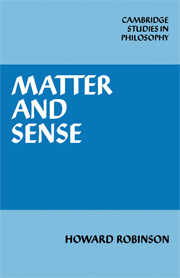Book contents
- Frontmatter
- Contents
- Acknowledgments
- 1 The materialist's problem and some non-reductive solutions
- 2 Supervenience and reduction
- 3 Behaviourism and stimulus materialism
- 4 The causal theory of mind
- 5 The disappearance theory
- 6 Reductive theories of perception
- 7 Matter: turning the tables
- Conclusion
- References
- Index
5 - The disappearance theory
Published online by Cambridge University Press: 07 May 2010
- Frontmatter
- Contents
- Acknowledgments
- 1 The materialist's problem and some non-reductive solutions
- 2 Supervenience and reduction
- 3 Behaviourism and stimulus materialism
- 4 The causal theory of mind
- 5 The disappearance theory
- 6 Reductive theories of perception
- 7 Matter: turning the tables
- Conclusion
- References
- Index
Summary
STATEMENT OF THE THEORY
At the beginning of chapter 1 we referred to three types of materialist theory. The most dramatic-sounding of these, namely the theory that sensations and consciousness do not exist, has as yet barely been mentioned. In this brief chapter I shall discuss the so-called ‘disappearance’ or ‘elimination’ theory of mind. The purpose of that discussion is to show two things. The first is that the disappearance theory, must, if it is to be coherent, involve the causal or functionalist theory: it does not represent an alternative approach. The second is that those elements in the theory that go beyond this, and which might be deemed its original parts, are misleading and generally false.
The motive for propounding the disappearance theory was to avoid analytical reductionism. Such reductionism will, in Richard Rorty's opinion, ‘inevitably get bogged down in controversy about the adequacy of proposed topic-neutral translations of statements about sensations’ (1965–6: 27). He therefore suggests an alternative form of the identity theory which supposedly does not involve giving any analysis of psychological discourse. According to the proposed theory, mental and physical are not related by strict Leibnitzian identity, and therefore there is no necessity of claiming that everything that can truly be said of one can truly be said of the other. Instead, he chooses as the model for the relation between mental and physical states the relation of entities in a scientific theory which is about to be abandoned to those entities which are postulated in the theory which is replacing it, and which perform the same explanatory role as the entities in the original theory.
- Type
- Chapter
- Information
- Matter and SenseA Critique of Contemporary Materialism, pp. 79 - 94Publisher: Cambridge University PressPrint publication year: 1982



